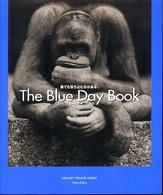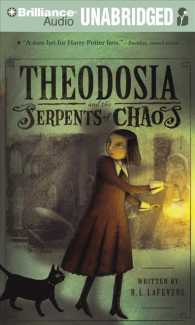- ホーム
- > 洋書
- > 英文書
- > Literary Criticism
Full Description
Focussing upon both canonical figures such as Woolf, Eliot, Pound, and Stein and emergent themes such as Christian modernism, intermedial modernism, queer Harlem Renaissance, this volume brings together previously unseen materials, from various archives, to bear upon cutting-edge interpretation of modernism. It provides an overview of approaches to modernism via the employment of various types of primary source material: correspondence, manuscripts and drafts, memoirs and production notes, reading notes and marginalia, and all manner of useful contextualising sources like news reports or judicial records.
While having much to say to literary criticism more broadly, this volume is closely focused upon key modernist figures and emergent themes in light of the discipline's 'archival turn' - termed in a unifying introduction 'achivalism'.
An essential ingredient separating the above, recent tendency from a much older and better-established new historicism, in modernist studies at least, is that 'the literary canon' remains an important starting point. Whereas new historicism 'is interested in history as represented and recorded in written documents' and tends toward a 'parallel study of literature and non-literary texts', archival criticism tends toward recognised, oftentimes canonical or critically-lauded, writers, presented in Part 1. Sidestepping the vicissitudes of canon formation, manuscript scholars tend to gravitate toward leading modernist authors: James Joyce, Ezra Pound, Virginia Woolf, Gertrude Stein, T.S. Eliot and Samuel Beckett. Part of the reason is obvious: known authors frequently leave behind sizeable literary estates, which are then acquired by research centres. A second section then applies the same empirical methodology to key or emergent themes in the study of modernism, including queer modernism; spatial modernism; little magazines (and online finding aids structuring them); and the role of faith and/or emotions in the construction of 'modernism' as we know it.
Contents
Introduction: Matthew Feldman, University of York, UK Erik Tonning, University of Bergen, Norway and Anna Svendsen, University of Pittsburgh, USA
Section I: Archival approaches to canonical Modernists
Chapter One: Useful Knowledge beyond the Beinecke: Gertrude Stein reading discourses of democracy and nationalism in Life Magazine and The Literary Digest, Dr Isabelle Parkinson, Queen Mary, University of London, UK
Chapter Two: WoofNotes: Virgina Woolf's reading and Research Notes Online, Prof. Michèle Barrett, Queen Mary, University of London, UK
Chapter Three: The Biopolitics of Mrs Dalloway: Intelligence and Sentiment, Dr Natasha Periyan, Royal Holloway, University of London, UK
Chapter Four: '[B]it by dirty jew mania for World Domination': Ezra Pound, Graham Seton Hutchison and Olivia Rossetti Agresti, Svetlana Ehtee, University of New Brunswick, Canada
Chapter Five: Will this Yowling Never Cease? The Pound/Agresti correspondence and the changing scope of Ezra Pound Studies, Prof. Alec Marsh, Muhlenberg College, PA, USA
Chapter Six: Clashes over Transcendence: T.S. Eliotand Karl Mannheim's dialogues on the future of civilisation, Dr Jonas Kurlberg, Durham University, UK
8. Chapter Seven: Methods of Montage in Beckett's 'Residua', Dr Anthony Paraskeva, University of Roehampton, UK
Part II: Emerging themes and approaches
9. Chapter Eight: David Jones's 'Balaam business': The Poetics of Forgiveness after Passchendaele, Dr Thomas Berenato, University of Virginia, USA
10. Chapter Nine: Modernist Archives and Little Magazine Networks, Dr Archie Henderson, Independent Scholar / Centre for Analysis of the Radical Right, UK
Chapter Ten: Modernist (dis)location: The Case of Katherine Mansfield, Dr Gerri Kimber, University of Northampton, UK
Chapter Eleven: "Gossip from abroad, or, why historicise modernism?, Dr Alexander Howard, University of Sydney, Australia
Chapter Twelve: Expanding the Archives of the Queer Harlem Renaissance: Richards Bruce Nugent's Unpublished Modernism, Dr David Deutsch, University of Alabama, USA
Chapter Thirteen: Q.D. Leavis, archives and the 'art of living', Prof. Miranda Dunham-Hickman, McGill University, Canada







